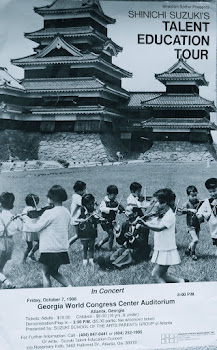When Dr. Suzuki named his school the "Talent Education Institute" in 1946, using the words "talent" and "education" together was basically considered a contradiction of terms. Talent was considered inborn and you either had it or you didn't. Education was for learning - reading, math and other subjects. Even as late as the early 1990's when I was traveling to Japan I read in a guidebook about the Talent Education Institute in Matsumoto as "education for the talented". Dr. Suzuki used the term "ability development" to help with this misunderstanding. When he was asked in an interview with Isako Itano in the book Where Love is Deep about the word talent he says:
"I used the word in the sense that talent is something to be nurtured, but since it's inconvenient if we are misunderstood, in the future I would like to eliminate the word talent and simply call it education, when common sense changes enough to allow me to do so." (1)
Recent research about learning continues to support Dr. Suzuki's belief in "ability development" through the right environment. In particular Daniel Coyle's book The Talent Code: Greatness isn't born. It's grown. Here's how. details how the brain develops, and how to maximize the learning process. The book is based on neurological research about how myelin forms in the brain, and what it's function is to learning. "Revolutionary", Dr. George Bartoklis, professor of neurology at UCLA told Daniel Coyle: "Myelin is 'the key to talking, reading, learn skills, being human."(2)
About that Daniel Coyle says:
"The revolution is built on three simple facts. (1) Every human movement, thought, or feeling is a precisely timed electric signal traveling through a chain of neurons - a circuit of nerve fibers. (2) Myelin is the insulation that wraps these nerve fibers and increases signal strength, speed, and accuracy. (3) The more we fire a particular circuit, the more myelin optimizes that circuit, and the stronger, faster, and more fluent our movements and thoughts become."(3)
Dr. Suzuki says: "Ability equals knowledge plus 10,000 times." (4) Knowledge is the mental aspect of acquiring talent. Talent is the ability to do in the present moment that which one knows. Through "10,000 times", the myelin wraps around the neural circuits and creates ability. Again Daniel Coyle says:
"Skill is myelin insulation that wraps neural circuits and that grows according to certain signals."(5)
When myelin wraps around the neurons with each repetition to develop pathways, or skills is exactly what Dr. Suzuki parallels in his statement: "Ability develops ability"(6) and gives the example of lanquage aquisition in babies. Once the pathway is developed, through intended repetition the skills become easy and fast.
Actions are electrical impulses sent along chains of nerve fibers that are connected together by synapsis. When you intend a movement the brain sends a signal through the chains of nerve fibers to your muscles. Different skills have specific pathways -"sort of like a string of Christmas lights".(7)
The next important concept about skills is that the more we develop a skill circuit, the more "automatic" or without conscious thought it becomes. The more we can process in our subconscious minds automatically the more complex skills we can do.
Myelin or "white matter" is the phospolipid membrane or dense fat that wraps around the nerve fibers preventing the electriacal impulses from leaking out. Since around the year 2000 many studies have come out with research regarding the role of myelin in the brain, and the increases in myelin linked with increases in various skills.
"Myelin quietly transforms narrow alleys into broad lightning-fast super-highways...Tennis players, singers, and painters don't seem to have much in common but they all get better by gradually improving timing and speed and accuracy, by honing neural circuitry, by obeying the rules of the talent code- in short by growing more myelin."(8)
Myelin grows. It can be nurtured and directed to develop talent. This is Dr. Suzuki's "law of ability".
Next, is to figure out how to optimize this process.
1. Where Love is Deep-The writings of Shin'ichi Suzuki, p. 111
2. The Talent Code by Daniel Coyle p.32
3. The Talent Code by Daniel Coyle p. 32
4. Every Child Can produced by the Suzuki Association of the Americas, p. 9
5. The Talent Code by Daniel Coyle p. 33
6. Ability Development from Age Zero by Shinichi Suzuki p.6
7. The Talent Code by Daniel Coyle p. 36
8. The Talent Code by Daniel Coyle p. 41...p.7
Other Blogs in this series:
The Talent Education Code Part 2
The Talent Education Code Part 3
The Talent Education Code Part 4





